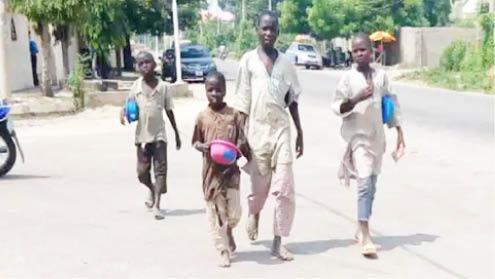Ahead of the 2023 general elections and with campaigns in full gear, leading presidential candidates have expressed commitment to ensure that Nigerian out-of-school children are returned to the classroom if they clinch the top job.
Nigeria is reputed as the country with the highest number, globally, of school age children who are not in school.
The United Nations Educational, Scientific and Cultural Organisation (UNESCO) in its recently released global data said Nigeria now had about 20 million out-of-school children out of its about 200 million population. This is more than the population of many individual countries. This challenge which seems intractable has become a regular campaign point for many at the local and national levels.
According to the UNESCO report, there are 244 million children and youths between the ages of six and 18 worldwide who are still out of school and “the region with the second highest out-of-school population is Central and Southern Asia with 85 million.” The top three countries with the most children and youths excluded from education are India, Nigeria and Pakistan.
- Christians Renew Faith As World Celebrates Christmas
- Arsenal, Man Utd ‘offered Joao Felix loan deal’
In January, 2022, the Minister of Education, Mallam Adamu Adamu, said the number of out-of-school children had reduced from 10.1 million in 2019 to 6.95 million in 2020. In the same vein, UNESCO in its recent report claimed it had enrolled 1.5 million children back to school.
Despite all the interventions, the new figure of 20 million out-of-school children as released by UNESCO leaves no one in doubt considering the spike in insecurity in the country; with abduction of students, attacks on schools and closure of many schools in the last few years.
With the election drawing closer, presidential candidates of major parties have promised to rescue the education sector as part of their campaign promises. Education has always remained top for most politicians during campaigns but not much has been done or achieved in the sector over the years.
The head United Nations Children’s Fund office in Kano, Rahama Farah said 18.5 million children in Nigeria have no access to education in 2022. UNICEF had put the number of out of school in 2021 at 10.5 million. The federal government in 2020 said 6.95 million children were out of school while in 2019 it was 10.1 million children. UNICEF in 2018 reported that 10 million children were out of school in Nigeria.
Presidential candidate of the All Progressives Congress (APC), Bola Tinubu, at an interactive session with the Arewa Joint Committee in Kaduna, said his administration would invest heavily in infrastructure to allow for proper integration of these children into conventional schools.
Tinubu said, “I will provide the required leadership and mobilise investment for the development of the (education) sector.”
Labour Party (LP) presidential candidate, Peter Obi, via his twitter handle: @Peterobi, said, “I will disrupt this trajectory of failure and wickedness in high places across Nigeria and give Nigerians back their country so that every child will have access to good school…”
He noted that the rural parts of Nigeria were trapped in abject poverty, “leaving our children, miserable and uneducated.”
According to the recent multi-dimensional poverty index released by the National Bureau of Statistics (NBS), 27 per cent of school age children in Nigeria are out of school and poor, 29 per cent of all school age children are not attending school and 94 per cent out-of-school children are very poor.
For the Peoples Democratic Party (PDP) presidential flag bearer, Atiku Abubakar, he said, “Even the Taliban-controlled Afghanistan has only 3.7 million children out of school while Nigeria has 20 million precious Nigerian children who are willfully denied school enrolment by a civilian administration.”
In a goodwill message at the 2022 Annual General Meeting (AGM) of the Association of Nigerian University Professional Administrators (ANUPA) in Port Harcourt, Rivers State, Atiku said, “We have promised that education is key to youth development. We will make sure that these children go back to school. Not only that, we will make sure that our universities reopen forever and ever.”
He emphasised that, “Basic education is a human right. No Nigerian child will be left behind when I become president next year as Allah will permit.”
Presidential candidate of the New Nigeria Peoples Party (NNPP), Senator Rabiu Kwankwaso, also pledged to mop up the 20 million out-of-school children.
Kwankwaso said, “We have clearly addressed the issue of 20 million out-of-school children in Nigeria and we are going to build 500,000 classrooms across the country; meaning that every child in this country should go to school.”
In his 150-page manifesto, Kwankwaso also said if elected he would ensure parents did not pay registration fees for West African Examination Council (WAEC), Joint Admission and Matriculation Board (JAMB) and National Examination Council (NECO).
The African Action Congress (AAC) presidential candidate, Omoyele Sowore, said, “By 2027 we would have reduced the out-of-school population by 80 per cent through targeted investments in education, social and economic support for families. As I often state, it will be a crime not to educate our kids in Nigeria.”
Reacting to UNESCO’s report on Nigeria’s figure of out-of-school children via Facebook, Sowore wrote: “The UNESCO has reported Nigeria has over 20 million children out of school! 20 million!! This is both a national disgrace and a state of emergency.
“Our #TakeitBack #SoworeMagashi2023 government will declare a state of emergency in the education sector and use a multi-stakeholder/multi-level approach in solving massive problems.
“In line with global best practices, we will engage families and communities and provide social and economic incentives to bring children back to school; we will create and strengthen safe school initiatives to make every child safe in school.”
All the candidates have promised to increase investment in the education sector to reverse the growing number of out-of-school children in the country.
An educationist, Michael Sule, said the number of out-of-school children was a continuous embarrassment to a nation like Nigeria.
He noted that it was a good development that politicians were aware of the challenge and were making commitments in that direction to address it.
Sule said, “I believe if we are really serious about issues of education in this country we should not use the issue of out-of-school children as part of campaign promises because it is something that ought to have been addressed by government; it’s the right of every Nigerian child to be educated and so government should not compromise on that.”

 Join Daily Trust WhatsApp Community For Quick Access To News and Happenings Around You.
Join Daily Trust WhatsApp Community For Quick Access To News and Happenings Around You.


